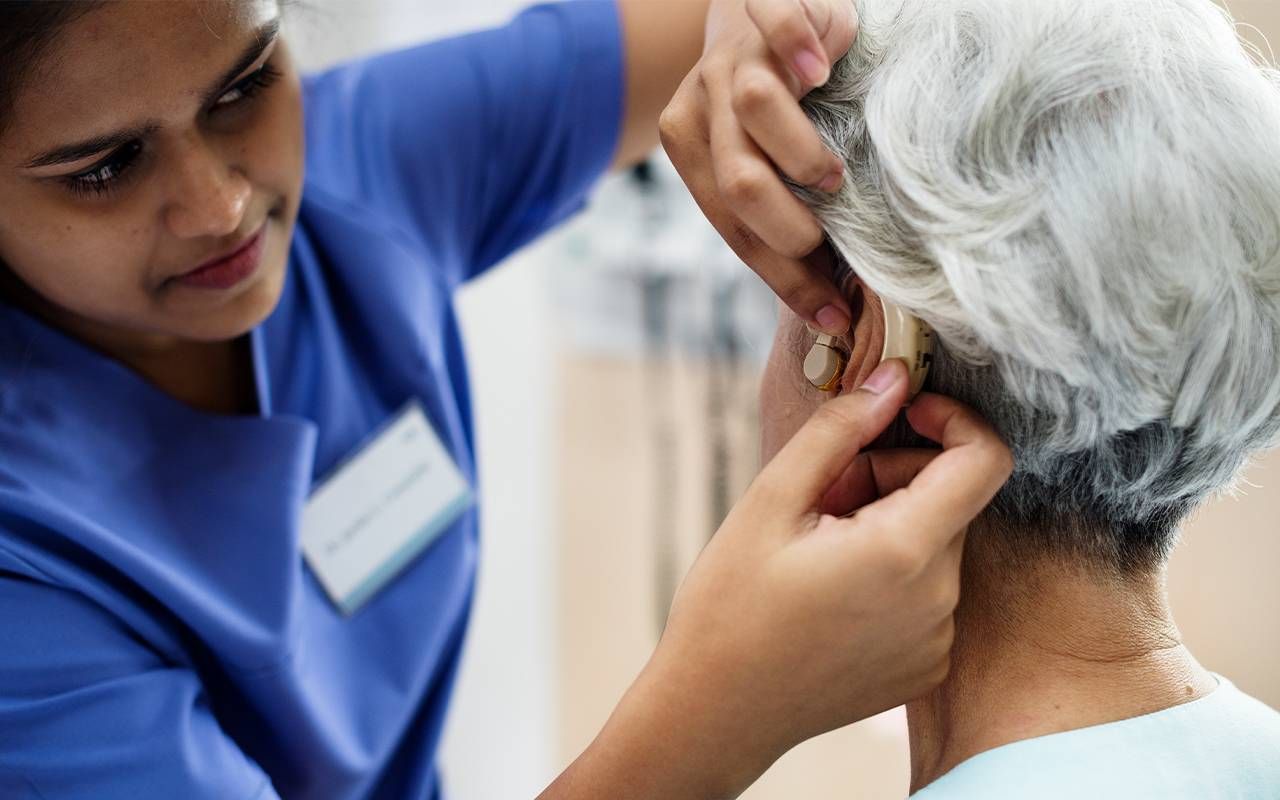Hear Better, Think Better
New research shows treating hearing loss can reduce cognitive decline
Several years ago, my audiologist warned me about the link between untreated hearing loss and dementia when she found out I wasn't wearing my hearing aids every day. I was so shocked I went searching for answers to how that could be.

Hearing loss doesn't mean dementia is inevitable, I learned. And scientists are unsure why this connection exists. One possibility is when people withdraw from social interaction because it's too difficult to hear, the isolation reduces brain stimulation and, consequently, memory and thinking ability.
Hearing loss doesn't mean dementia is inevitable, I learned. And scientists are unsure why this connection exists.
Another is, with less sound, the auditory processing parts of the brain can shrink leading to cognitive decline and dementia risk. Also, it could be that when we don't hear clearly the brain has to work harder to understand, leaving less capacity for other thinking processes. Or the explanation could be a combination of all three.
With any of these scenarios, hearing aids may help because they provide clearer sound, making it easier to hear, improving social engagement and stimulating the brain. But it hasn't been known whether wearing hearing aids can prevent, reduce or reverse cognitive decline.
When I was exploring, the first-ever randomized controlled trial designed to answer these questions, called the Aging and Cognitive Health Evaluation in Elders (ACHIEVE) study, was just starting. So, I've been looking forward to the results. Now, The Lancet has published initial findings and the lead researchers are presenting results to multiple audiences.
How the Three-Year ACHIEVE Study Was Done
Dr. Frank Lin, the Johns Hopkins University researcher who co-led this groundbreaking research, described the study, its findings and their policy implications at a National Institutes of Health (NIH) Director's lecture series. ACHIEVE followed nearly 1,000 adults age 70-84 with untreated mild to moderate hearing loss and normal thinking and memory abilities for three years.
Participants were randomly assigned to either a hearing intervention or control group. The hearing intervention group was fitted with hearing aids and counseled by an audiologist on how to use them and ways to hear better in specific situations. The control group received 10 Keys to Healthy Aging education that focuses on chronic disease prevention which was tailored to each individual. Both groups participated in follow-up sessions every six months.
"Hearing intervention may reduce cognitive loss within three years for populations of older adults at risk for cognitive decline."
The majority of the participants were self-selected volunteers recruited through advertisements. But about one-fourth were already participating in a randomized long-term heart health study. As it turned out, the most crucial result came from this heart health group.
What Was Learned from the Three-Year ACHIEVE Study
On average, the ACHIEVE heart health group was older and had more risk factors for cognitive decline than the rest of the participants. Their baseline cognitive scores were lower too, even though they tested within the normal range.
Yet those who were given hearing aids and audiology support showed remarkable change. For them, hearing treatment reduced the loss of cognitive function by about half (48%) by the end of the trial.
With this important finding, Lin concludes that "hearing intervention may reduce cognitive loss within three years for populations of older adults at risk for cognitive decline."
Hearing aids helped in other ways too. Participants given hearing aids were satisfied with the devices and audiologists' support and they felt their communication improved.
Aging Brains Can Change
Another part of the ACHIEVE study included an exploratory analysis of MRI assessments on less than half of the participants. Researchers wanted to see if any physical brain changes occurred by the end of their study.
Scientists know that when hearing loss goes untreated, visual tasks take over auditory regions and the brain loses the ability to process sound, a phenomenon known as "cross-modal recruitment." Another type of brain change, called "cortical thinning," is a natural process of aging. But when it happens more quickly in some brain regions, it may be an indicator of future neurocognitive disorders such as Alzheimer's Disease.
"It's a signal that the hearing aid intervention seems to be doing something to the brain."
"We didn't think we'd see anything," in the MRIs, says Lin. "Three years isn't much time." But researchers were surprised. The MRI analysis revealed less cortical thinning in the group that received hearing loss treatment than in the control group. Further, the brain areas that process language and speech and relay auditory information were most affected.
"It's a signal that the hearing aid intervention seems to be doing something to the brain," says Lin. While he emphasizes the exploratory nature of the MRI component of ACHIEVE, it's encouraging news about the brain's ability to change itself. "None of us would have ever predicted that the adult brain was plastic enough to respond in the way you measured," said an awed NIH audience member during the Q&A session.
That plasticity may be pointing toward an explanation for the hearing loss-dementia link too. It could be that sustained hearing aid use itself changes the brain. Or the improved social and physical activity that better hearing facilitates indirectly affects the brain. It'll take more studies to know for sure but the scientists are excited by these new clues.
Medicare Coverage for Hearing Aids and Audiology Consulting
Both the 2020 Lancet Commission on Dementia Prevention, Intervention and Care and the 2021 National Plan for Alzheimer's Disease recommend addressing hearing loss in prevention strategies. The ACHIEVE study results support this recommendation. Yet despite such evidence, Medicare doesn't cover hearing aids.
According to Lin, hearing aids and audiology services were included in the 2021 White House Build Back Better Act but failed in the Senate. "Right now, the best practice intervention would not be covered under traditional Medicare," he says.
Over-the-Counter (OTC) Hearing Aids
Most insurance doesn't cover hearing aids either, or covers them at far less than the actual cost when buying them from an audiologist. Through the OTC market, people with perceived mild to moderate hearing loss can now buy hearing aids directly and at lower cost.
According to the American Academy of Audiology, in addition to differences in technology, OTC aids cost less because people are "buying only the device and not any professional services." Even so, many purchasers end up going to an audiologist for help with their new aids. In the ACHIEVE study itself, participants received personally-fitted hearing aids plus audiology counseling.
The OTC market just started in October 2022 when the over-the-counter hearing aid rule went into effect. As consumers try out these new devices and companies shift their offerings over the next few years, it could be that OTC sales will include more audiology support and counseling. Lin says most people will need it.
"The U.S. is the first country in the world to have a regulated OTC market," he says. "It will change as bigger companies get in."
Regular Self-Hearing Testing Across the Lifespan
Most Americans have their hearing tested in early grade school then not again until late life. Usually when someone gets frustrated with their inability to hear. Lin wants to change that.
"My goal for every teen and adult around the world is to understand and track their hearing over their lifetime."
On average it's about nine years between the time we need hearing aids and when we actually get them. But if we could test our own hearing easily, perhaps that timeframe would shorten —especially in light of the growing evidence that leaving the loss untreated raises our risk for dementia in later life.
"When consumers know something about their health through a metric, be it glucose or blood pressure, it changes behavior," says Lin. "It changes how you think about what to do about it."
Know Your Hearing Number
Monitoring our hearing, understanding it and de-stigmatizing hearing treatment are goals of the Know Your Hearing Number campaign. Between October 2022 and July 2023, Lin and the Consumer Technology Association standards group met to develop a "hearing number" that tells you how loud speech must be for you to hear it. The higher the number, the louder sounds must be.
Now that this standard is established, hearing testing can be built into smartphones, headphones and other consumer electronic devices. The idea is, these apps can prompt you to test your hearing and then optimize your device to meet your hearing needs. The Apple Mimi app already exists, but other companies are developing them too.
"My goal for every teen and adult around the world is to understand and track their hearing over their lifetime," says Lin. Other than financial, there's really no downside to hearing aid treatment. But there definitely are downsides to letting it go.


